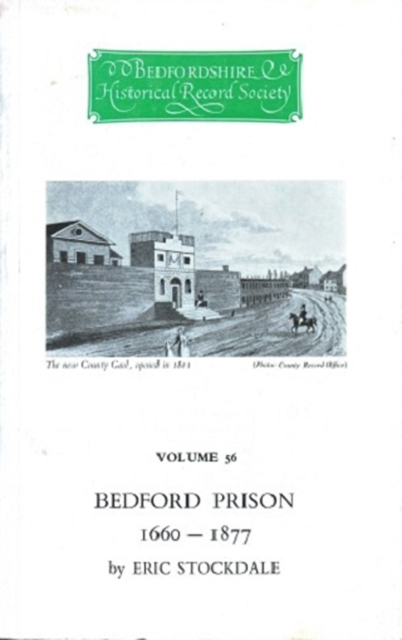Book contents
- Frontmatter
- Contents
- Acknowledgments
- Foreword
- Introduction
- Chapter 1 John Bunyan 1660-1688
- Chapter 2 Some Contemporaries of Bunyan
- Chapter 3 The Richardson-Howard Family of Jailers 1711-1814
- Chapter 4 Transportation to America Before 1776
- Chapter 5 John Howard 1773-1790
- Chapter 6 Samuel Whitbread 1790-1815
- Chapter 7 Philip Hunt 1815-1835
- Chapter 8 Philip Hunt 1815-1835
- Chapter 9 Lord John Russell In Office 1835-1841
- Chapter 10 The Rebuilding of The Jail 1839-1849
- Chapter 11 The Unsettled Years 1849-1853
- Chapter 12 The Final Years Before Nationalisation 1853-1877
- Conclusion
- Note On References and Spelling
- Appendix 1 Bedford in 1765
- Appendix 2 Jailers of Bedford 1710-1885
- Appendix 3 The Richardson-Howard Family
- Appendix 4 Site Plan of Bunyan’s Jail
- Appendix 5 Deed of Appointment of Jailers 1740
- Appendix 6 The Whitbread-Howard Link
- Appendix 7 Lord John Russell’s Family
- Appendix 8 Bedford in 1841
- Appendix 9 The Jail in 1849
- Index of Names
- Subject Index
- Bedfordshire Historical Record Society
- Miscellaneous Endmatter
Chapter 5 - John Howard 1773-1790
Published online by Cambridge University Press: 03 August 2023
- Frontmatter
- Contents
- Acknowledgments
- Foreword
- Introduction
- Chapter 1 John Bunyan 1660-1688
- Chapter 2 Some Contemporaries of Bunyan
- Chapter 3 The Richardson-Howard Family of Jailers 1711-1814
- Chapter 4 Transportation to America Before 1776
- Chapter 5 John Howard 1773-1790
- Chapter 6 Samuel Whitbread 1790-1815
- Chapter 7 Philip Hunt 1815-1835
- Chapter 8 Philip Hunt 1815-1835
- Chapter 9 Lord John Russell In Office 1835-1841
- Chapter 10 The Rebuilding of The Jail 1839-1849
- Chapter 11 The Unsettled Years 1849-1853
- Chapter 12 The Final Years Before Nationalisation 1853-1877
- Conclusion
- Note On References and Spelling
- Appendix 1 Bedford in 1765
- Appendix 2 Jailers of Bedford 1710-1885
- Appendix 3 The Richardson-Howard Family
- Appendix 4 Site Plan of Bunyan’s Jail
- Appendix 5 Deed of Appointment of Jailers 1740
- Appendix 6 The Whitbread-Howard Link
- Appendix 7 Lord John Russell’s Family
- Appendix 8 Bedford in 1841
- Appendix 9 The Jail in 1849
- Index of Names
- Subject Index
- Bedfordshire Historical Record Society
- Miscellaneous Endmatter
Summary
Howard as High Sheriff in 1773
The story of John Howard has often been told—not surprisingly since he was the world’s first great penal reformer. The seventeen-year period beginning with his appointment as High Sheriff of Bedfordshire in 1773 and ending with his death in Cherson in Russia in 1790 was a period which included several crucial developments in the history of imprisonment. Each one of these concerned Howard greatly, and each one affected the county jail. The main events were Howard’s revelations and the public response to them; the revolt of the American colonies and the ending of transportation for the time being; the introduction of the hulks as a ‘temporary’ measure whilst the idea of penitentiaries ‘was explored; and the reintroduction of transportation, but to Australia instead of America.
Howard was an unlikely choice for the post of High Sheriff. He was a nonconformist and a leading member of the Bunyan Meeting until the year of his appointment, when he and other members of the congregation disagreed with the minister about the question of infant baptism and set up a new congregational church a little way from the meeting house. The new church was built halfway between Bunyan’s church and the jail. Howard continued to act as a trustee of the Bunyan Meeting and kept on his town house next door to it. Unlike Bunyan, Howard was not a Bedfordshire man, but he had lived for some years in Cardington, near Bedford and also near Elstow, Bunyan’s village. In Cardington he had vied with his relative, Samuel Whitbread the Elder, one of the Members of Parliament for Bedford, to see who could do more to improve the lot of the villagers. Howard’s grandmother Martha was the sister of Whitbread’s father. Unlike many Sheriffs Howard had never served as a magistrate, but he had had the experience of being a prisoner of the French in 1756.
Howard wrote from Cardington on 27 October 1762 to Whitbread at his brewery in Chiswell Street in the City of London—where the business is still operating: ‘We have lately got the workmen clear of the house for this year, and hope to complete my small habitation.
- Type
- Chapter
- Information
- Bedford Prison 1660-1877 , pp. 66 - 83Publisher: Boydell & BrewerFirst published in: 2023

